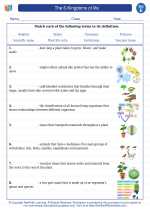The 6-Kingdoms of life -> eukaryotic
Eukaryotic Cells
Eukaryotic cells are the building blocks of complex organisms, including plants, animals, fungi, and protists. They are distinguished by the presence of a nucleus, which houses the cell's genetic material, and various other membrane-bound organelles that carry out specific functions within the cell.
Nucleus
The nucleus is the control center of the cell, containing the cell's genetic material in the form of DNA. It is surrounded by a double membrane called the nuclear envelope, which regulates the passage of materials into and out of the nucleus.
Membrane-Bound Organelles
Eukaryotic cells contain a variety of membrane-bound organelles, each with its own specific function. These include the endoplasmic reticulum, Golgi apparatus, mitochondria, chloroplasts (in plant cells), lysosomes, and peroxisomes, among others. These organelles play key roles in processes such as protein synthesis, energy production, and waste management.
Cellular Structure
Eukaryotic cells are typically larger and more complex in structure than prokaryotic cells, which lack a nucleus and membrane-bound organelles. The cytoplasm of a eukaryotic cell is filled with a network of membrane-enclosed compartments and a complex system of internal membranes that facilitate various cellular processes.
Reproduction
Eukaryotic cells reproduce through a process called mitosis, in which a parent cell divides to produce two identical daughter cells. In addition, some eukaryotic cells, such as those in sexual organisms, can undergo meiosis to produce gametes (eggs and sperm) for sexual reproduction.
Evolutionary Significance
The development of eukaryotic cells was a critical step in the evolution of complex life on Earth. The presence of a nucleus and membrane-bound organelles allows for greater specialization and efficiency within the cell, enabling the development of multicellular organisms with diverse tissues and organ systems.
.◂Science Worksheets and Study Guides Fifth Grade. The 6-Kingdoms of life

 Activity Lesson
Activity Lesson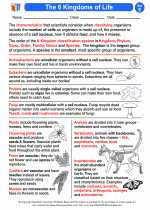
 Worksheet/Answer key
Worksheet/Answer key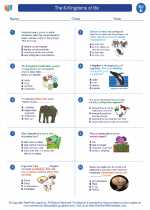
 Worksheet/Answer key
Worksheet/Answer key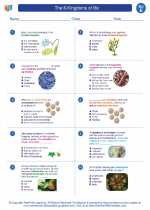
 Worksheet/Answer key
Worksheet/Answer key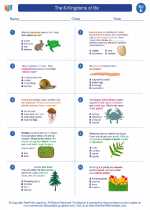
 Worksheet/Answer key
Worksheet/Answer key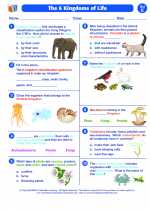
 Vocabulary/Answer key
Vocabulary/Answer key
 Vocabulary/Answer key
Vocabulary/Answer key
 Vocabulary/Answer key
Vocabulary/Answer key
 Vocabulary/Answer key
Vocabulary/Answer key